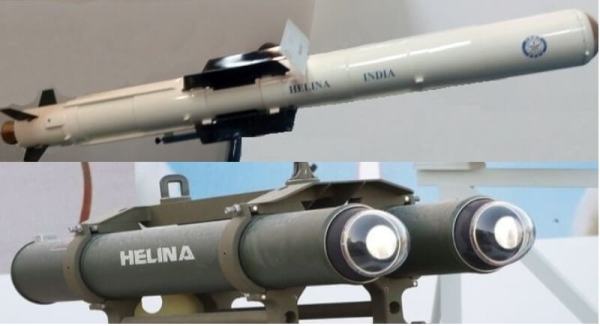India, on 19 February, successfully test fired the Army and Air Force versions of anti tank guided missiles (ATGMs) from the desert ranges in Rajasthan indicating the readiness of the weapon systems for an early induction in the Armed Forces
There are two versions of the missile: the army version is called Helina, while the Indian Air Force (IAF) version is called Dhruvastra. Their specifications remain identical, but they are named differently since the army and IAF are pursuing them as separate projects. Both are designed to be launched from the Rudra – the armed variant of the indigenous Dhruv Advanced Light Helicopter (ALH). They can strike and set afire enemy tanks at ranges between 500 metres and seven kilometres.
Joint user trials of Army version Helina and Air Force version Dhruvastra missile systems were carried out from advanced light helicopter (ALH) platform.
Five missions were carried out for evaluating the capabilities of the missiles in minimum and maximum range. Indigenously developed by DRDO, the missiles were fired in hover and max forward flight against realistic static and moving targets. A couple of missions were carried out with warheads against derelict tanks. A mission was also carried out against a moving target from a forward flying helicopter.
The first stage of the missile’s development was for the army as a vehicle-mounted ATGM called Nag, which was carried on a modified BMP-2 armoured carrier called the NAMICA (Nag Missile Carrier). However, this has a maximum range of only four kilometres and the army asked for this to be developed further into a longer-range missile that could be fired from a helicopter. The result was the Helina – or helicopter-mounted Nag.
The system, which operates on fire and forget mode, has all weather day and night capability. The weapon system can defeat battle tanks with conventional armour as well as with explosive reactive armour. The missile will equip the weaponised version of the ALH Dhruv, HAL built combat helicopter Rudra and light combat helicopter (LCH).
The Helina and Dhruvastra are officially classified as third generation, Lock on Before Launch (LOBL), fire and forget ATGMs. That means that the missile pilot locks her sight cross-hairs onto the target before launching the missile, after which the missile finds its own way to the target. The missile can be programmed to strike the target in one of two ways – direct hit mode, or else in top attack mode, where it dives down and strikes the tank on the upper part of the turret, where armour protection is thinnest.


















